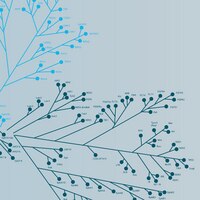Rho proteins, mental retardation and the neurobiological basis of intelligence.
van Galen, Elly J M and Ramakers, Ger J A
Prog. Brain Res., 147: 295-317 (2005)
2005
概要を表示する
For several decades it has been known that mental retardation is associated with abnormalities in dendrites and dendritic spines. The recent cloning of eight genes which cause nonspecific mental retardation when mutated, provides an important insight into the cellular mechanisms that result in the dendritic abnormalities underlying mental retardation. Three of the encoded proteins, oligophrenin1, PAK3 and alphaPix, interact directly with Rho GTPases. Rho GTPases are key signaling proteins which integrate extracellular and intracellular signals to orchestrate coordinated changes in the actin cytoskeleton, essential for directed neurite outgrowth and the generation/rearrangement of synaptic connectivity. Although many details of the cell biology of Rho signaling in the CNS are as yet unclear, a picture is unfolding showing how mutations that cause abnormal Rho signaling result in abnormal neuronal connectivity which gives rise to deficient cognitive functioning in humans. | 15581714
 |
Rho proteins, mental retardation and the cellular basis of cognition.
Ramakers, Ger J A
Trends Neurosci., 25: 191-9 (2002)
2002
概要を表示する
For several decades, it has been known that mental retardation (MR) is associated with abnormalities in dendrites and dendritic spines. The recent cloning of seven genes that cause nonspecific MR when mutated provides important insights in the cellular mechanisms that result in the dendritic abnormalities associated with MR. Three of the encoded proteins, oligophrenin 1, PAK3 and alpha PIX, interact directly with Rho GTPases. Rho GTPases are key signaling proteins that integrate extracellular and intracellular signals to orchestrate coordinated changes in the actin cytoskeleton essential for directed neurite outgrowth and the regulation of synaptic connectivity. Although many details of the cell biology of Rho signaling in the CNS are still unclear, a picture is unfolding showing how mutations that alter Rho signaling result in abnormal neuronal connectivity and deficient cognitive functioning in humans. Conversely, these findings illuminate the cellular mechanisms underlying normal cognitive function. | 11998687
 |
p21-activated kinases: three more join the Pak.
Jaffer, Zahara M and Chernoff, Jonathan
Int. J. Biochem. Cell Biol., 34: 713-7 (2002)
2002
概要を表示する
The p21-activated kinases (Paks) are serine/threonine protein kinases that bind to and, in some cases, are stimulated by activated forms of the small GTPases, Cdc42 and Rac. With the recent discovery of several novel isoforms, Paks are now categorized into two subgroups based on architectural similarities. The Group I Paks (Pak1, Pak2, Pak3) have been studied in greater detail and shown to be involved in the regulation of cellular processes such as gene transcription, cell morphology, motility, and apoptosis. Here we summarize recent findings that shed light on the newly recognized Group II Paks (Pak4, Pak5, Pak6) and review both similarities and differences between kinases of the two Pak subgroups. | 11950587
 |
Cytostatic p21 G protein-activated protein kinase gamma-PAK.
Roig, J and Traugh, J A
Vitam. Horm., 62: 167-98 (2001)
2001
概要を表示する
The p21-activated protein kinase gamma-PAK, also known as PAK2, has very different properties from the other two highly conserved isoforms of the PAK family, alpha-PAK (PAK1) and beta-PAK (PAK3). gamma-PAK has cytostatic activity, as shown by inhibition of cleavage of early frog embryos following microinjection of gamma-PAK and by inhibition of growth when expressed in mammalian cells. gamma-PAK is activated in response to a variety of stresses including radiation- and chemically-induced DNA damage, hyperosmolarity, addition of sphingosine, serum starvation, and contact inhibition. Activation occurs through at least two signaling pathways, depending on the type of stress, one of which requires phosphoinositide 3-kinase and/or tyrosine kinase activity. During apoptosis gamma-PAK is cleaved by caspase 3 and activated and appears to have a role in the apoptotic response. gamma-PAK is present in the cytosol, associated with the membrane and in secretory granules. A wide variety of substrates have been identified for gamma-PAK. We propose gamma-PAK may be involved in coordinating the stress response, possibly in conjunction with other stress response proteins. | 11345898
 |





















